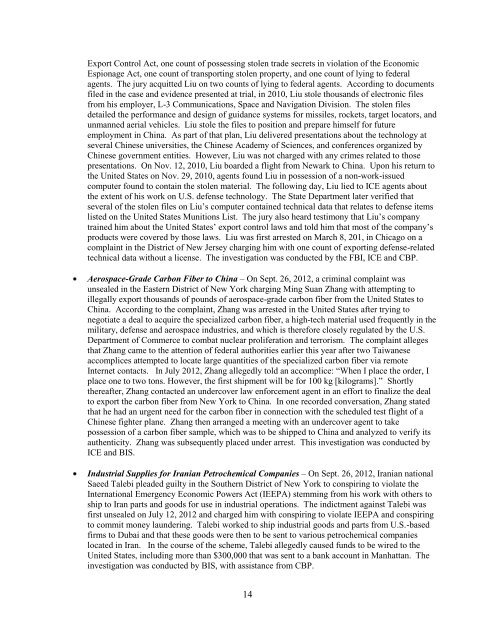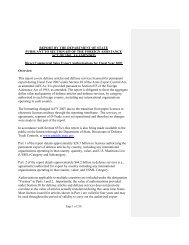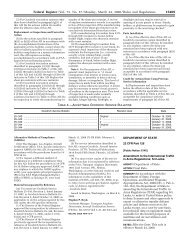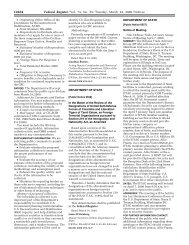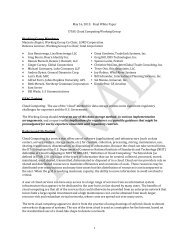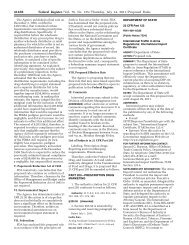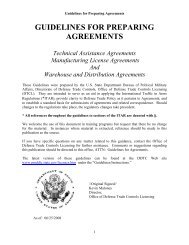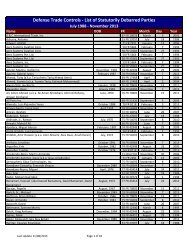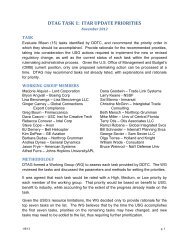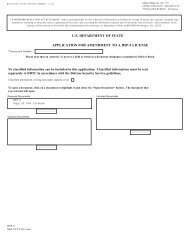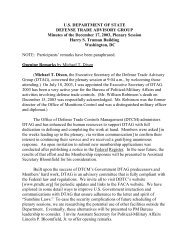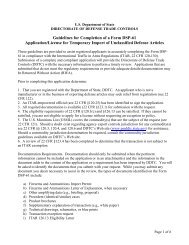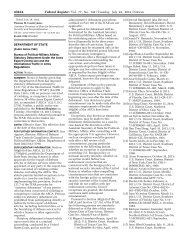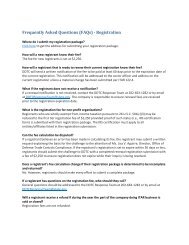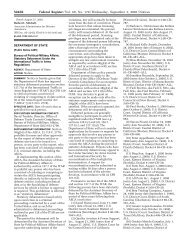Major Export Enforcement Cases - Directorate of Defense Trade ...
Major Export Enforcement Cases - Directorate of Defense Trade ...
Major Export Enforcement Cases - Directorate of Defense Trade ...
You also want an ePaper? Increase the reach of your titles
YUMPU automatically turns print PDFs into web optimized ePapers that Google loves.
<strong>Export</strong> Control Act, one count <strong>of</strong> possessing stolen trade secrets in violation <strong>of</strong> the Economic<br />
Espionage Act, one count <strong>of</strong> transporting stolen property, and one count <strong>of</strong> lying to federal<br />
agents. The jury acquitted Liu on two counts <strong>of</strong> lying to federal agents. According to documents<br />
filed in the case and evidence presented at trial, in 2010, Liu stole thousands <strong>of</strong> electronic files<br />
from his employer, L-3 Communications, Space and Navigation Division. The stolen files<br />
detailed the performance and design <strong>of</strong> guidance systems for missiles, rockets, target locators, and<br />
unmanned aerial vehicles. Liu stole the files to position and prepare himself for future<br />
employment in China. As part <strong>of</strong> that plan, Liu delivered presentations about the technology at<br />
several Chinese universities, the Chinese Academy <strong>of</strong> Sciences, and conferences organized by<br />
Chinese government entities. However, Liu was not charged with any crimes related to those<br />
presentations. On Nov. 12, 2010, Liu boarded a flight from Newark to China. Upon his return to<br />
the United States on Nov. 29, 2010, agents found Liu in possession <strong>of</strong> a non-work-issued<br />
computer found to contain the stolen material. The following day, Liu lied to ICE agents about<br />
the extent <strong>of</strong> his work on U.S. defense technology. The State Department later verified that<br />
several <strong>of</strong> the stolen files on Liu’s computer contained technical data that relates to defense items<br />
listed on the United States Munitions List. The jury also heard testimony that Liu’s company<br />
trained him about the United States’ export control laws and told him that most <strong>of</strong> the company’s<br />
products were covered by those laws. Liu was first arrested on March 8, 201, in Chicago on a<br />
complaint in the District <strong>of</strong> New Jersey charging him with one count <strong>of</strong> exporting defense-related<br />
technical data without a license. The investigation was conducted by the FBI, ICE and CBP.<br />
Aerospace-Grade Carbon Fiber to China – On Sept. 26, 2012, a criminal complaint was<br />
unsealed in the Eastern District <strong>of</strong> New York charging Ming Suan Zhang with attempting to<br />
illegally export thousands <strong>of</strong> pounds <strong>of</strong> aerospace-grade carbon fiber from the United States to<br />
China. According to the complaint, Zhang was arrested in the United States after trying to<br />
negotiate a deal to acquire the specialized carbon fiber, a high-tech material used frequently in the<br />
military, defense and aerospace industries, and which is therefore closely regulated by the U.S.<br />
Department <strong>of</strong> Commerce to combat nuclear proliferation and terrorism. The complaint alleges<br />
that Zhang came to the attention <strong>of</strong> federal authorities earlier this year after two Taiwanese<br />
accomplices attempted to locate large quantities <strong>of</strong> the specialized carbon fiber via remote<br />
Internet contacts. In July 2012, Zhang allegedly told an accomplice: “When I place the order, I<br />
place one to two tons. However, the first shipment will be for 100 kg [kilograms].” Shortly<br />
thereafter, Zhang contacted an undercover law enforcement agent in an effort to finalize the deal<br />
to export the carbon fiber from New York to China. In one recorded conversation, Zhang stated<br />
that he had an urgent need for the carbon fiber in connection with the scheduled test flight <strong>of</strong> a<br />
Chinese fighter plane. Zhang then arranged a meeting with an undercover agent to take<br />
possession <strong>of</strong> a carbon fiber sample, which was to be shipped to China and analyzed to verify its<br />
authenticity. Zhang was subsequently placed under arrest. This investigation was conducted by<br />
ICE and BIS.<br />
Industrial Supplies for Iranian Petrochemical Companies – On Sept. 26, 2012, Iranian national<br />
Saeed Talebi pleaded guilty in the Southern District <strong>of</strong> New York to conspiring to violate the<br />
International Emergency Economic Powers Act (IEEPA) stemming from his work with others to<br />
ship to Iran parts and goods for use in industrial operations. The indictment against Talebi was<br />
first unsealed on July 12, 2012 and charged him with conspiring to violate IEEPA and conspiring<br />
to commit money laundering. Talebi worked to ship industrial goods and parts from U.S.-based<br />
firms to Dubai and that these goods were then to be sent to various petrochemical companies<br />
located in Iran. In the course <strong>of</strong> the scheme, Talebi allegedly caused funds to be wired to the<br />
United States, including more than $300,000 that was sent to a bank account in Manhattan. The<br />
investigation was conducted by BIS, with assistance from CBP.<br />
14


